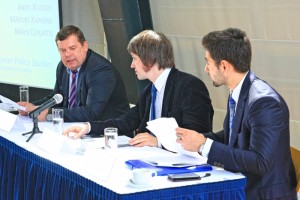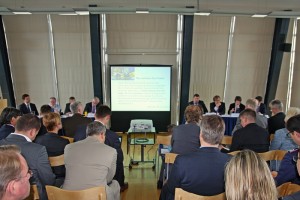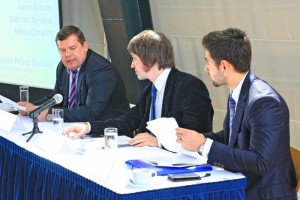
On June 17, a research “Russia’s Information Campaign against Ukraine: from Vilnius Summit to Crimean Referendum” was presented in Riga. The research was carried out by Andis Kudors and Maris Cepuritis, the researchers of Centre for East European Policy Studies and Martins Kaprans, PhD in communication science. The study was commissioned by the NATO StartCom Centre of Excellence.
It is planed to translate the research also in English, but the summary and conclusions in English are already available below.

Russian Foreign Policy Review (2007): „Our main task is to create effective information campaigns everywhere where we detect real challenges for Russia’s interests, by maintaining wide public consensus about Russia’s Foreign Policy course.”
Informational dimension plays an increasingly important role in the relationships between states. Soft power, public diplomacy, strategic communications, influence and information operations are just part of communications arsenal which can characterize attempts by a state or non-state actor to influence social and political processes or military operations.
The term „information war” is a popular term among Russian TV commentators when referring to military operations or discussing peace-time conflicts of values and ideas among nations.
Unprecedented flow of propaganda in the main Russian TV channels, starting from summer 2013 until Russian aggression in Ukraine, has renewed interest of different researchers in Russia. The military activities in Ukraine have been secondary to the political steps accompanied by Russia’s communication activities.
In order to understand actions of the Russian state in the media field, one has to understand the way of thinking of the Russian power elite. Manipulation, selected reflection and interpretation of events in a controlled manner are the key elements. The lack of media freedom in Russia works as a supporting factor. The theoretical part of the research focuses on those control mechanisms which Russia is using in its own information space and in the neighbouring countries. This helps to understand how Russia implemented the information campaign in Ukraine in order to achieve political and military goals.
The research overviews the Russian information security policy and the practice of several Russian information campaigns. The empirical part of the research looks at the ways how Russian state executes power over mass media, synchronises messages for internal and external audiences, controls media agenda, narratives and thematic frames. The research is a pilot Project. The acquired data and conclusions can be used for further in-depth research on Russia’s public diplomacy, information operations and strategic influence.
The key conclusions of the research imply:
The aim of the Russia’s information campaign against Ukraine at the end of 2013 and the beginning of 2014 was to hamper Ukraine’s integration into the EU by destroying Ukraine’s territorial integrity and unitary state structure. The campaign would not be possible without Russian state control over the key Russian mass media which helped to promote certain narratives about Ukraine in the largest Russian TV channels during the past several years.
The Russia’s information campaign was oriented towards internal and external (Ukrainian, other post-Soviet country) audiences. TV is the primary source of information for Russia’s population and is highly trusted despite serious violations of media freedom in the country. The wide audience, the high trust and state control mechanisms make the TV the most suitable channel for spreading messages of the Russian state.
Although the audience of Russian TV channels in Ukraine is rather small, these channels are trusted in Russian speakers’ audience.
The Russian TV is suitable for distributing messages also to the Russians living abroad. It also serves well for multiplication of information – the clips from Russian TV are spread in the social media.
Russian information campaign against Ukraine was implemented in a synchronous manner by distributing coordinated messages among all involved TV channels. The campaign was executed with high intensity and by adopting and changing the main messages depending on the specific tactical political and military aims of the time.
When reflecting events in Ukraine, the journalists of the Russian TV systematically cultivated the feeling of fear. During the initial phase of the conflict a sense of insecurity of one’s future and fear of Ukraine’s economic instability was cultivated in the whole of Ukraine’s society. As the events on Maidan escalated, the nationalist radicals were brought to the front of the news reports thus emphasising on the topic of physical threat. That was first and foremost addressed at the Russian speaking population of the Eastern Ukraine.
Since Vilnius Summit the Russian TV news reports have purposefully degraded Maidan protests, at the same time attempting to legitimize Russia’s policy towards Ukraine. The protection of Russian speakers abroad has been established by the help of the TV channels as the main legitimizing factor.
Whilst reporting on Ukraine events, the Russian journalists have methodologically manipulated with video materials. In order to produce video materials for the news reports, staged events, montage and amateur videos were used. Such methods of communication have notably strengthened the execution of the main task of the Russian news reports – to radicalize political opposition and to discredit the West (USA and EU).
